- Home
- Isaac Hooke
Warden 3 Page 3
Warden 3 Read online
Page 3
Thanks to the armored hull of their craft, the dosage they received as they passed across Jupiter was only equivalent to the background cosmic rays they might get while on a spacewalk. However, considering the limited protection the suits provided, it was only recommended that one expose oneself to such background radiation for a few hours—but Rhea and her companions were subjected to the rays for days as they passed across Jupiter. Even Horatio wore a suit, because those high energy particles could damage delicate machine circuitry as well.
Horatio was the only one who had disabled his O2 flow. Rhea and Will needed oxygen of course, and they occasionally had to maneuver to the craft’s engine compartment to refill their units at the main tanks.
“I feel like I’m melting in here,” Will said at one point.
“That’s just sweat,” Rhea said. “Might want to turn down the heat of your inner environment.”
“It’s not sweat,” Will said. “I’m really melting.”
“Cosmic rays cause neural damage,” Horatio said. “Perhaps the part of your brain responsible for the identification of your physical form has been injured, and you merely believe yourself to be liquifying.”
“Thanks for cheering me up, Tin Can,” Will quipped. He shifted where he was strapped in place to the overhead above. “I’m just sick of being cooped up, I think. Got cabin fever to the extreme. Doesn’t help that I’m a bit claustrophobic… you’re throwing me into a tight spacesuit, inside a tiny cabin, aboard a cramped ship.”
“Well, if it helps, there’s only a six-meter wall between you and the void of space,” Rhea said.
“Doesn’t help,” Will said. “At all.”
The deck thrummed softly as the spacecraft no doubt underwent one of its latest course adjustments. It also emitted a gentle moan, which she heard courtesy of the external microphones of her suit. Considering all the different forces the craft was currently being subjected to, Rhea wasn’t surprised the metal would complain thus.
“I hate it when the ship shakes like that,” Will said. “Makes me feel like we’re going to be ripped apart.”
“She’ll hold up,” Rhea said. “The Molly Dook is a good ship.”
“Keep telling yourself that,” Will said. “I mean come on, it’s called the Molly Dook. That name doesn’t evoke the strong hull you’d associate with an Intrepid or Challenger.”
“For me,” Horatio said, “when I feel the hull shake, I always wonder if we’re under attack. But then I remind myself that if we were under attack, I wouldn’t feel a thing. None of us would. One moment we’d be alive inside this cargo hold, and the next our constituent parts would be floating aimlessly through the void of space, alongside the wreckage of the Molly Dook.”
They tried to play the usual VR games while passing over Jupiter. However, they all did poorly, even Targon: they were simply too distracted. Especially considering that the hull vibrations could be felt in the VR environment. Even so, they forced themselves to continue gaming, as some distraction was better than none at all.
Finally, Jupiter was well behind them, and Ganymede lay ahead. The hull stopped creaking, and the radiation levels dropped somewhat.
Will immediately opened his face plate. “Well, that’s a bit better. Slightly less stuffy. Though not by much.”
“What did you expect?” Rhea said, likewise opening her helmet. “You’ve gone from breathing the stale, recycled air of a spacesuit, to the stale, recycled air of a star craft. Not much difference there.”
“No, I suppose not,” Will agreed.
A few minutes later, Targon announced they were on final approach to Ganymede
“Still no sign of our trigger-happy friends,” Will said afterward. “Maybe it was pirates after all. They retreated to hunt easier prey after we dodged their railgun attack. After all, who’d want to follow someone into the hellish trajectory of a gas giant?”
Rhea nodded absently.
“You don’t really believe it, do you?” Will pressed. Softer, as if to himself: “Of course not. I don’t believe it.”
“If an assassin pursues, he won’t give up so easily,” Horatio agreed. “Unfortunately, there isn’t much we can do about it until he makes an appearance.”
“Well, either way, we’re almost there,” Will said. “I guess we’ll find out soon enough.”
Targon jetted into the cargo bay. He was wearing a spacesuit just like the others, but unlike them, his visor was currently sealed. His jetpack was strapped on to the upper back.
“Well, I did it.” Targon’s voice carried over the comm line. “Carried the Warden successfully to Ganymede, I did. We’ll be landing shortly.”
“Thank you,” Rhea said. “I truly appreciate this. Without you, I’d still be stuck on Earth.”
“That might have been for the best, considering what you’ll find here,” Targon said.
“And what is it you think I’ll find?” Rhea pressed.
In answer, Targon merely turned about and started to jet from the cargo bay. He paused to glance over his shoulder at her. “I’ll be back this way in a few weeks if you need a ride. I can’t really afford to expend the propellant to retrieve ye, but I’ll do it anyway out of the kindness of me heart.”
“That’s nice of you,” Rhea said. “To be honest, though, I’m not sure if I’ll take you up on the offer. I might want to stay longer than a few weeks.”
“Well, message me if you need me,” Targon said.
“I will,” she promised.
“Make sure you send the message before the twentieth,” Targon said. “After that, I’ll be well beyond Jupiter and on me way to Earth—me propellant levels will be far too low to turn back at that point.”
She nodded, making a mental note to send any message before the twentieth. If possible, it would be best to transmit well before that date: while it would only take a few hours to deliver her message via the Delay-tolerant network that spanned the planets, it was possible the emissions from Jupiter would interfere. She’d read that the radiation occasionally spiked, causing “storms” that lasted for days and which blacked out all communications across the Galilean moons. Hence, if she wanted to go, the sooner she could get in touch with Targon, the better.
Assuming I want to leave Ganymede.
Maybe she’d fall in love with the place. She couldn’t say, not yet.
“I don’t suppose we can remove these spacesuits?” Will transmitted.
Targon had already disappeared around the bend, but he peeked back inside at those words. “No, no, no, me boy. It’s standard protocol. They won’t let ye dock if you’re not suited up. I’ll be providing video evidence. Speaking of which, you’ll need to seal your faceplates. Go on now.”
“Video evidence can be faked…” Will said, but he closed his helmet.
Rhea sealed her own, as did Horatio.
Satisfied, Targon nodded to himself and then vanished from view around the bend.
“All these protocols for us to follow…” Will said.
“I’m sure they’ve instituted them for a reason.” Rhea glanced at the robot. “Even Horatio could be fined if he emerges from the ship without a sealed suit.”
“Yeah, I know,” Will said. “As little sense as that makes.”
“Apparently, it’s part of the decon procedure,” Rhea said. “They’ll scan us for contagions when we enter. And if any are detected, they’ll whisk us off to isolation. Robots included.”
“Sounds like fun,” Will said. “Though if you ask me, it’s a system ripe for abuse. They can pretend we’ve set off some contagion alarm and use that as an excuse to confine us indefinitely. If, for example, the United Settlements decided to radio Centaar, and tell them that it would be politically expedient to confine the Warden, for example…”
“Except the Europans have nothing to gain by confining me,” Rhea said. “And neither does the United Settlements. In fact, if United Settlements wanted me confined, they would have done so already, before I left Aradne in a shuttle b
ound for space.”
“Yes, but what better place to confine you, than far away from your own followers?” Will said. “Out here, there are no Wardenites to set you free. In fact, I doubt anyone even knows who you are here. The Europans have their own streaming video sites. Their own local heroes. No one watches VidTube or SubverseTube here—the videos take forever to download from Earth.”
“I have to agree with Rhea on this one,” Horatio said. “The United Settlements has nothing to gain by confining her. She was perhaps the enemy of Aradne for some time, but the mayor of said city certainly has no reason to confine her, not anymore. Not after she set him free of Veil.”
Targon interrupted their conversation with a transmission. “Warden, would ye and your fine companions like to view the external feed during our approach?”
“Yes, of course,” Rhea said.
She received a sharing request on her HUD and accepted. She enlarged the resultant video feed so that it filled her vision and redistributed it to Will and Horatio.
The moon swallowed the stars below them, forming a big, dirty ball of gray and black illuminated beneath the sun. She’d read all about it before leaving: the surface was composed of a mantle of frozen water covered in grooves and ridges and pocked with impact craters. Beneath the icy crust, which averaged one hundred kilometers deep, lay an internal ocean containing more water than all of Earth’s combined. It was this ocean that had driven Earth to war against the Ganymedeans thirty years ago.
At the bottom of the ocean resided trenches of silicate rock, similar to that found within Earth’s crust. Above the ice mantle, Ganymede had a paper-thin oxygen and hydrogen atmosphere.
Though it was the largest moon in the solar system, with a diameter of five thousand two hundred six kilometers, it was also one of the least dense, giving Ganymede a gravity of only 0.149 G, which was comparable to Earth’s moon.
Ganymede had a weak magnetic field that was overpowered by Jupiter’s much more powerful field. She could see a portion of the satellites composing the superconducting ring network that once augmented the moon’s meager magnetosphere. Built by the superior technology of the Ganymedeans, the ring network had obvious gaps, denoting where swaths of satellites had been destroyed during the war.
As the Molly Dook continued its descent, she spotted an opaque geodesic dome squatting on the surface below: the Europan colony of Centaar. Because the damaged ring network was no longer powerful enough to deflect all of Jupiter’s radiation, the dome had BNNTS embedded throughout, similar to the spacesuit she wore, though at a much higher density and thickness of course. As such, she couldn’t see inside.
The Europans had apparently attempted to repair the ring network by capturing and dismantling some of the satellites involved, but they had yet to reverse engineer the advanced technology involved.
As they got closer to the colony, Rhea kept expecting the alarm to sound, but it didn’t. She was beginning to believe the attack had been by pirates after all, who were now long gone.
In the distance to the south she could see one of the self-contained drilling platforms that were apparently common to this moon. Towering metal frameworks were attached to each of the four corners of the platform, and at the center was a boxlike building that harbored the drill, which the Europans used to extract water from the frozen crust below. There was a large landing pad next to the platform where water transports could land and fill up.
Rhea returned her attention to the colony ahead. The Molly Dook descended to the same altitude as the base of the dome—a large, metal ring that protruded slightly from the rest of the structure. As the ship approached, doors opened in the side of that ring, revealing a hangar beyond. The ship passed through, and as it touched down on what looked like a large conveyor belt inside, she felt the deck rumble gently.
Large squarish LEDs embedded in the ceiling provided light, illuminating the other shuttles and vessels perched on similar conveyor belts nearby. Behind the Molly Dook, the bay doors closed.
Rhea exhaled in relief and glanced at Will. “No attack.”
Will nodded, saying nothing.
“We’re here,” Targon announced over the comm. “The hangar bay will pressurize shortly, and then the conveyor belt will take us to customs.”
4
Rhea watched via the external camera as white mist erupted from vents that lined the lower portions of the hangar walls. That mist was no doubt part of the pressurization process Targon had mentioned. It took several minutes, but slowly that mist became more translucent, until she couldn’t see it at all.
After another five minutes, a smaller set of bay doors parted ahead of the craft, just big enough to fit the Molly Dook. The conveyor belt system activated and the Molly Dook lurched forward.
In moments the vessel passed through the smaller opening and into an adjacent hangar bay. Actually it was more of a corridor than a bay, coming in at far longer than it was wide or tall. The doors closed behind the Molly Dook as the vessel slid onto another conveyor belt that abutted the first.
At the far side of the corridor, another set of doors opened, and once more the Molly Dook switched to another conveyor belt. It passed through into a much smaller hangar bay, and when the doors closed behind it, the craft came to a halt.
Large robotic arms unfolded from the walls next to the shuttle, preparing to unload the cargo.
“You might want to vacate the hold,” Targon said over the comm. “The robots will be wanting to unload your belongings. I’ve already marked off the necessary crates on the manifest.”
The bulkhead shuddered as external hatches began to open.
Rhea removed the straps that secured her to the floor and stood up. Gravity glued her to the floor. She finally felt the weight of the suit, but it seemed light, little more than the weight of a heavy cloak on Earth. Which made sense, considering 0.149 G was almost one-seventh Earth’s gravity. She took a tentative step and was surprised at how far the motion carried her. After a few more she quickly adapted, bounding more than two paces for every ordinary step she might take on Earth, this despite the bulky suit she wore. She scraped the low overhead a few times with her helmet, and discovered it was better to lean in the direction she wanted to go, keeping her center of mass forward so that she wouldn’t arc too high. At the entrance, she had to pull herself through the tighter doorway.
Will and Horatio similarly adapted, and they joined her in the ship’s corridor. Behind her, in the cargo hold, the far bulkhead fell away. There was no atmospheric decompression—the external atmosphere matched the internal. The pincers of a big robotic arm reached inside and removed a crate.
That would be our belongings.
“We are to debark now,” Targon said over the comm.
He emerged from the bridge hatch, using that bounding walk Rhea had only just learned, and stood next to the bulkhead. The deck shuddered as a hatch slid down and formed a ramp to the floor outside.
Targon led the way with those big, bounding steps. Rhea followed, slowly stepping from the ship, hanging onto the railing as she descended. She considered using the lower gravity to jump down in a single leap but thought better of it lest she make a fool of herself—she still wasn’t completely comfortable in the lighter environment. Also, there was a chance potential assassins might use the moment of debarkation to strike, so that was another reason to take extra care. She warily surveyed her surroundings as she descended, however she saw only the empty corridor, and the Molly Dook.
Targon reached a walkway and vaulted into a small opening in the wall. Rhea followed, taking smaller, bouncing steps.
She found herself in a long corridor. A share request appeared on her HUD.
Centaar Customs, Ganymede, would like to open up a private channel. Do you accept? (Y/N)
She accepted.
“Please remain still,” a metallic voice intoned over the comm.
A conveyor belt activated beneath her, dragging her forward.
Different colored
lamps flashed from the corridor walls around her, and Rhea was under the impression she was being scanned.
“Checking us for contagions,” Will transmitted. “Just watch, they’re going to say we’re infected with something and need to be transferred to isolation.”
As she neared the far side of the corridor, the voice over the comm told her: “You have been granted entry. You may open your helmet at your convenience.”
“Guess I was wrong,” Will said. “Happens, from time to time.”
Rhea opened the faceplate of her helmet and the internal life support system of the spacesuit instantly shut down. She took a deep breath. The air smelled… musty. Not as stale as the transport craft, but she could still tell it was recycled.
A pair of doors opened at the far side of the corridor, and Targon sprung through. Rhea stepped off the ramp and followed, taking a bounding leap. She emerged in some sort of receiving area that was part of a larger terminal. The ceiling here arched far overhead, providing ample room for the bounding steps supported by the lower gravity.
A long counter was set against the wall beside her. Two robots with plasma rifles embedded in their arms stood guard on the far end. Defense turrets also hung from the ceiling, ready to open fire if any of the new arrivals proved threats.
“Please approach the counter,” the metallic voice intoned.
Rhea removed her helmet, resting it between one gloved hand and her hip, and let her artificial hair hang down. Then she took three arcing steps to the counter.
“Please activate augmented reality overlays if you have not done so already,” the metallic voice said in her head.

 Warden 2
Warden 2 Devastator
Devastator Warden 4
Warden 4 Emperor
Emperor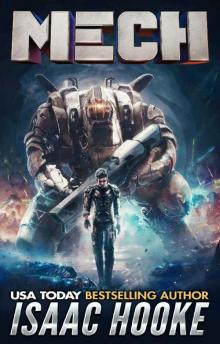 Mech
Mech Conqueror
Conqueror Fighter
Fighter The Forever Gate Ultimate Edition
The Forever Gate Ultimate Edition Defiler
Defiler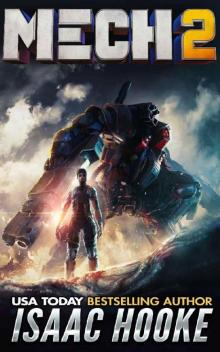 Mech 2
Mech 2 Warden 3
Warden 3 Warden 1
Warden 1 Mech 3
Mech 3 Forerunner
Forerunner The Alliance (AI Empire Book 2)
The Alliance (AI Empire Book 2) Breaker (Monster Tamer Book 1)
Breaker (Monster Tamer Book 1) Bender of Worlds
Bender of Worlds The Pendulum Swings (The Forever Gate Book 8)
The Pendulum Swings (The Forever Gate Book 8) The Link
The Link Just Another Day
Just Another Day Star Warrior
Star Warrior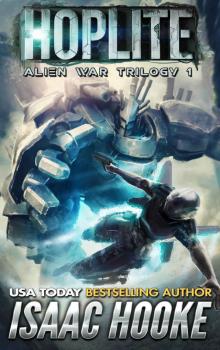 Alien War Trilogy 1: Hoplite
Alien War Trilogy 1: Hoplite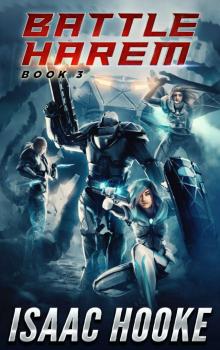 Battle Harem 3
Battle Harem 3 The Ethan Galaal Series: Books 1 - 3
The Ethan Galaal Series: Books 1 - 3 Reloaded
Reloaded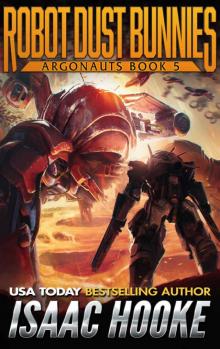 Robot Dust Bunnies (Argonauts Book 5)
Robot Dust Bunnies (Argonauts Book 5) Battle Harem
Battle Harem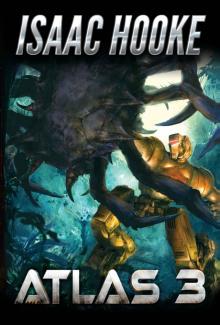 ATLAS 3 (ATLAS Series Book 3)
ATLAS 3 (ATLAS Series Book 3) Argonauts 2: You Are Prey
Argonauts 2: You Are Prey Worlds at War (A Captain's Crucible Book 5)
Worlds at War (A Captain's Crucible Book 5)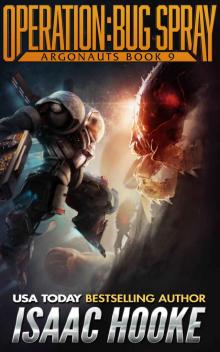 Operation: Bug Spray (Argonauts Book 9)
Operation: Bug Spray (Argonauts Book 9)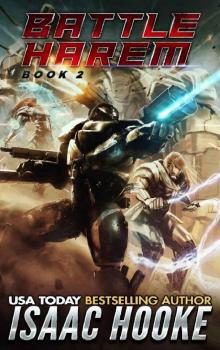 Battle Harem 2
Battle Harem 2 Redeemed (Bolt Eaters Trilogy Book 3)
Redeemed (Bolt Eaters Trilogy Book 3)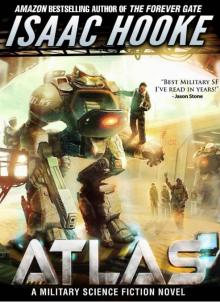 Atlas
Atlas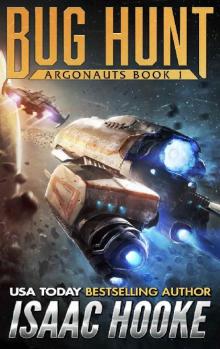 Argonauts 1: Bug Hunt
Argonauts 1: Bug Hunt Reactivated (Bolt Eaters Trilogy Book 1)
Reactivated (Bolt Eaters Trilogy Book 1)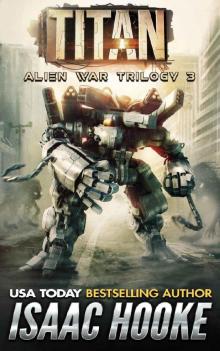 Alien War Trilogy 3: Titan
Alien War Trilogy 3: Titan Flagship (A Captain's Crucible #1)
Flagship (A Captain's Crucible #1)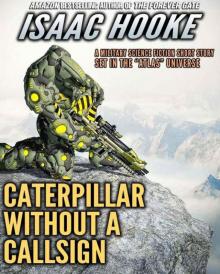 Caterpillar Without A Callsign
Caterpillar Without A Callsign The Forever Gate
The Forever Gate He Who Crosses Death (Star Warrior Quadrilogy Book 3)
He Who Crosses Death (Star Warrior Quadrilogy Book 3) Reforged (Bolt Eaters Trilogy Book 2)
Reforged (Bolt Eaters Trilogy Book 2) Refurbished
Refurbished Reloaded (AI Reborn Trilogy Book 2)
Reloaded (AI Reborn Trilogy Book 2) He Who Crosses Death
He Who Crosses Death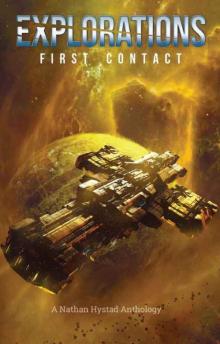 Explorations: First Contact
Explorations: First Contact Planet Killer (A Captain's Crucible Book 4)
Planet Killer (A Captain's Crucible Book 4)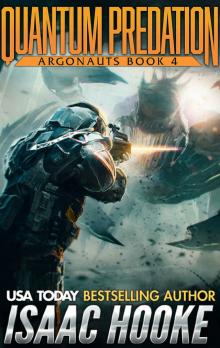 Quantum Predation (Argonauts Book 4)
Quantum Predation (Argonauts Book 4) Clandestine-IsaacHooke-FreeFollowup
Clandestine-IsaacHooke-FreeFollowup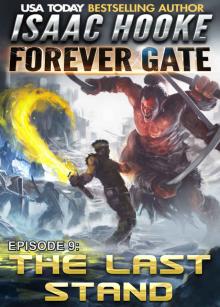 The Last Stand (The Forever Gate Book 9)
The Last Stand (The Forever Gate Book 9) City of Phants (Argonauts Book 6)
City of Phants (Argonauts Book 6)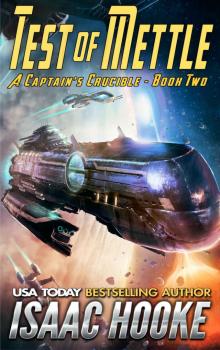 Test of Mettle (A Captain's Crucible Book 2)
Test of Mettle (A Captain's Crucible Book 2)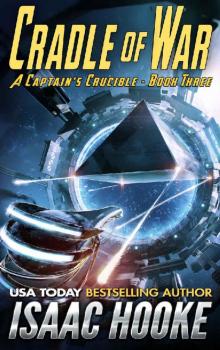 Cradle of War (A Captain's Crucible Book 3)
Cradle of War (A Captain's Crucible Book 3) Rade's Fury (Argonauts Book 7)
Rade's Fury (Argonauts Book 7) Rebirth (The Forever Gate Book 6)
Rebirth (The Forever Gate Book 6) The Forever Gate Compendium Edition
The Forever Gate Compendium Edition Mechs vs. Dinosaurs (Argonauts Book 8)
Mechs vs. Dinosaurs (Argonauts Book 8) Alien War Trilogy 2: Zeus
Alien War Trilogy 2: Zeus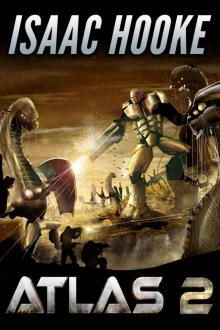 ATLAS 2 (ATLAS Series Book 2)
ATLAS 2 (ATLAS Series Book 2)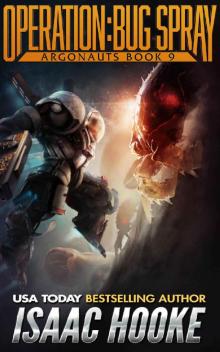 Operation_Bug Spray
Operation_Bug Spray